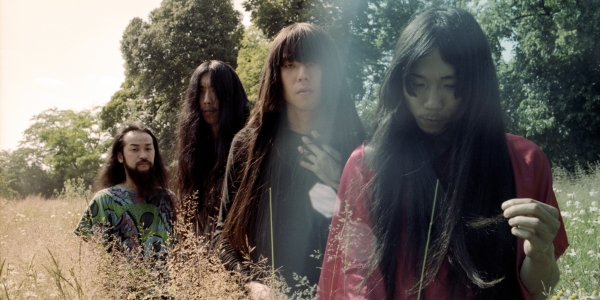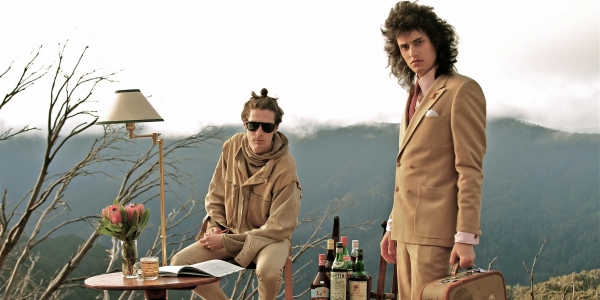“It was such a superb and brilliant experience for us,” recalls guitarist Yuki Tsujii. “As you can imagine a church is already quite holy, and physically because it’s got such high ceilings, it’s good a really nice room sound, with lots of reverb on it. So even if you don’t use any reverbs or effects, the sound is really massive. It was quite special to play there.”
And it wasn’t just Bo Ningen that appreciated the uniqueness of the moment. “People just came down and sat watching the show, but by the end of it, without even realising it, the audience was standing up, and going crazy,” Tsujii says. “It was great to have that contrast with a normal gig.”
Bo Ningen formed originally in 2007. Bass player Tagen Kawabe and guitarist Kohhei Matsuda met while playing on the same bill in London; Tsujii and drummer Monchan Monna joined later. “They talked about Japanese underground music, and decided to go to the studio and do an experimental, free-form type of record.”
Independently, Tsujii was pondering playing and recording a similar style of music; serendipitously, a mutual friend introduced him to Kawabe and Matsuda. “Tagen asked me to join the jam, so we had a 10 hour jam session in the studio.”
The original concept of Bo Ningen built on the band members’ various interests, which ranged from the acid rock of Jimi Hendrix through to the free-form jazz of John Coltrane to Tsujii’s interest in world music. “We all have different music that we’re interested in, but we’re all in the same direction,” Tsujii says. “Personally, I’m into world music, Tagen’s more into club music with heavy bass, Kohhei’s into free jazz and experimental stuff. So we’re all spread it, but in the same direction.”
Bo Ningen’s take on psychedelic music focuses on the simultaneous sonic experiences that can be opened up to the audience. “We used to put on our profile pages on Facebook that to us psychedelia was like standing between the loud and quiet sides,” Tsujii says. “And to watch us was like staring at both sides at the same time – it could be extremely loud, or very quiet. It doesn’t have to be crazy, or it doesn’t have to be properly structured music. It’s something between a border, and seeing it all at the same time. For us, that’s being psychedelic.”
The very nature of psychedelic rock leaves it open to local, and culturally-specific interpretation. While the members of Bo Ningen have now been in London for ten years – having moved there originally to study – their Japanese background is still relevant to the music they create.
“In general, Western psychedelic music and Japanese psychedelic music are quite different,” Tsujii says. “Western psychedelia tends to be rooted in garage music. Because of the time gap between the Western psychedelia, and when Japanese psychedelic bands started, they’re quite different. There are other Japanese psychedelic bands with a folky kind of sound, but with stupid amounts of noise.” Bo Ningen puts itself between those two contrasting aspects of psychedelia. “We’ve been in London for ten years, it’s our base – essentially we’re a British band, but we’re Japanese. So we’re some sort of hybrid, I suppose.”
Tsujii says Bo Ningen enjoys the challenge of improvisation in a live environment, though it also relies heavily on the song format for structure. “It’s semi improvised – we now have songs, whereas we didn’t used to have songs,” Tsujii says. “But sometimes we don’t play the songs, if we’re doing some live improvisation for a soundtrack to a film or an art show. But normally the last part of the set is going to be a 15 or 20 minute free-form jam.”
As can be seen in the YouTube clip for the concluding track to the St Leonard’s Church set, Bo Ningen revels in the libertarian psychedelic experience. “We want the audience to be free, and we don’t want to limit ourselves either,” Tsujii says.
BY PATRICK EMERY







